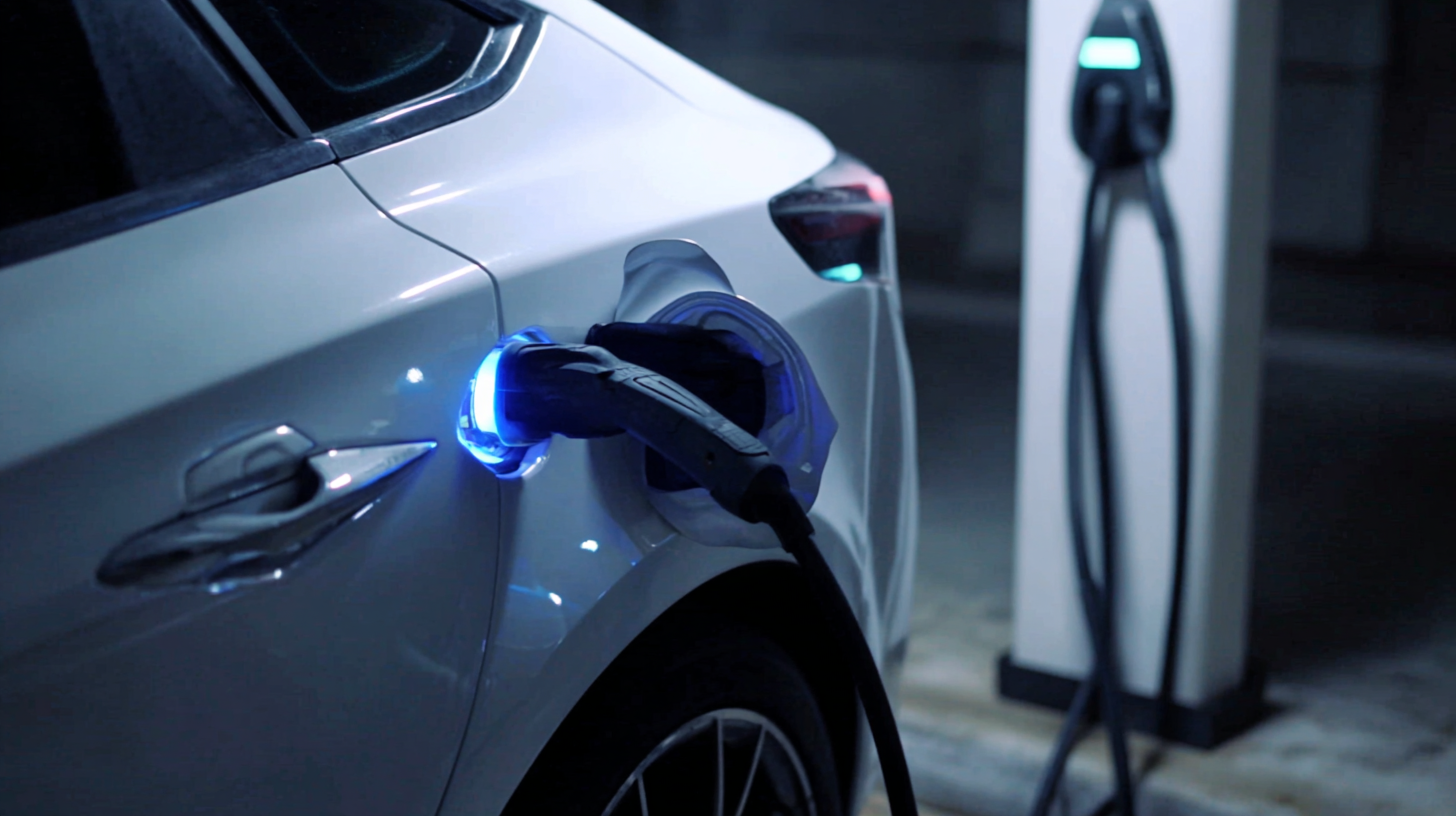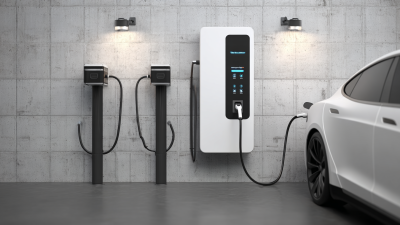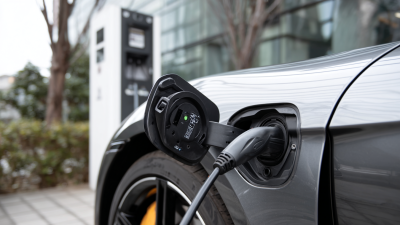
Wall Mounting EV Charge Station
The Future of Sustainable Energy How Electric Car Chargers are Transforming Transportation
As the world pivots towards sustainable energy solutions, the role of Electric Car Chargers is becoming increasingly pivotal in transforming the transportation landscape. According to a report by the International Energy Agency (IEA), the number of electric vehicles (EVs) on the road is projected to reach 145 million by 2030, underscoring the urgent need for an extensive charging infrastructure. In line with this shift, the global electric vehicle charging station market is expected to witness a growth from $4.24 billion in 2022 to $20.25 billion by 2030, indicating a compound annual growth rate (CAGR) of 21.67%. This growth highlights not only the rising adoption of electric vehicles but also the critical importance of Electric Car Chargers in facilitating this transition. As governments and private sectors invest in charging technologies, the integration of these systems will be essential for achieving sustainable transportation goals and reducing carbon emissions.

Understanding the Importance of Sustainable Energy in Modern Transportation
Sustainable energy has become a crucial pillar in modern transportation, as the world shifts towards greener practices. According to the International Energy Agency (IEA), electric vehicles (EVs) are projected to account for 30% of new vehicle sales by 2030, significantly reducing greenhouse gas emissions. As the demand for electric cars rises, the importance of accessible and efficient electric car chargers becomes paramount. The transition to sustainable energy sources not only mitigates environmental impact but also supports energy security and economic growth.
Integrating renewable energy sources, such as solar and wind, into EV charging infrastructure enhances sustainability efforts further. A report from the U.S. Department of Energy highlights that combining EV chargers with renewable energy systems can reduce carbon emissions by up to 70% compared to traditional fossil fuel sources. This innovation not only promotes cleaner transportation but also inspires a broader shift towards sustainable energy consumption across various sectors.
**Tip:** As cities expand their EV charging networks, it's wise for individuals to consider home charging solutions powered by renewables, such as solar panels. This can maximize efficiency and significantly lower energy costs while supporting a sustainable lifestyle.
**Tip:** Businesses should invest in electric vehicle charging stations to cater to the growing number of EVs among consumers. This not only demonstrates a commitment to sustainability but also attracts eco-conscious customers looking for environmentally friendly service options.
The Future of Sustainable Energy: How Electric Car Chargers are Transforming Transportation
| Region | Number of EV Chargers | Percentage of Green Energy Usage | Growth Rate of EV Adoption (2022-2023) | Major Charging Infrastructure Investments (Million $) |
|---|---|---|---|---|
| North America | 120,000 | 45% | 15% | 2,500 |
| Europe | 300,000 | 60% | 20% | 5,000 |
| Asia-Pacific | 500,000 | 55% | 25% | 3,500 |
| Latin America | 30,000 | 30% | 10% | 800 |
| Africa | 10,000 | 25% | 5% | 150 |
The Role of Electric Car Chargers in Reducing Carbon Footprint
Electric car chargers play a pivotal role in reducing the carbon footprint associated with transportation. As electric vehicles (EVs) become increasingly popular, the infrastructure surrounding them is crucial to their success in lowering greenhouse gas emissions. By providing a convenient means for recharging, electric car chargers encourage more drivers to transition from traditional gasoline-powered vehicles to cleaner alternatives. This shift is essential in addressing the challenges posed by climate change and air pollution, as the transportation sector is a significant contributor to carbon emissions globally.
Moreover, the integration of renewable energy sources into charging stations enhances their positive impact on sustainability. Many electric car chargers are now being powered by solar or wind energy, which further decreases the reliance on fossil fuels. This move is not only beneficial for the environment but also promotes energy independence. As electric car charging technology continues to evolve, it offers innovative solutions such as smart chargers that optimize charging times based on energy demand and availability. These developments underscore the essential role that electric car chargers play in fostering a sustainable transportation ecosystem, ultimately supporting the broader goal of reducing humanity’s carbon footprint.

Innovative Technologies Driving Electric Vehicle Charging Solutions
The rapid evolution of electric vehicle (EV) charging solutions is a cornerstone in the transformation of sustainable transportation. Innovative technologies are reshaping how we think about charging infrastructure, facilitating wider adoption of electric cars. For instance, according to a report by the International Energy Agency, the number of publicly available charging points worldwide surged to over 1.3 million in 2021, marking a growth of 60% from the previous year. This explosive growth underscores the urgent need for efficient and accessible charging solutions to support the increasing number of EVs on the road.
Among the emerging technologies, ultra-fast charging systems have garnered significant attention, offering charging times as short as 15-30 minutes, comparable to traditional gasoline refueling. A study from McKinsey & Company highlights that by 2030, nearly 70% of EV charging will occur at home or at work, yet the demand for public charging remains crucial. Companies are also exploring wireless charging methods, which could further streamline the charging process, making it more convenient for motorists. As the industry continues to innovate, these advancements in EV charging technology not only enhance user experience but also play a critical role in achieving global sustainability targets.
The Future of Sustainable Energy: Electric Vehicle Charging Solutions
This chart illustrates the growth of electric vehicle (EV) charging stations over the past five years, highlighting the increasing adoption of sustainable energy in transportation. The data reflects the number of charging stations installed each year, showcasing the transformative impact of innovative technologies in the EV sector.
Challenges and Solutions in the Expansion of Charging Infrastructure
As electric vehicles (EVs) gain popularity, the expansion of charging infrastructure faces several challenges that need to be addressed for sustainable energy to thrive. According to a report by the International Energy Agency (IEA), the global electric car stock reached 10 million units in 2020, with projections suggesting 145 million EVs by 2030. This rapid adoption underscores the urgent need for a robust and accessible charging network. However, current infrastructure is often limited, with urban areas witnessing a higher demand than rural counterparts, leading to potential inequities in accessibility.
To tackle these challenges, innovative solutions are emerging. Smart city initiatives are prioritizing the installation of charging stations in dense urban centers, leveraging public-private partnerships to enhance funding and operational efficiency. A recent analysis indicates that by 2025, there will be a need for at least 3 million public charging points globally to meet demand. This shift toward more comprehensive infrastructure planning is critical, as it ensures that EV charging is as convenient as refueling a conventional vehicle.
Tip: To maximize convenience, consider living in areas with high charging station density. Use apps to locate nearby chargers ahead of time, and explore options for home charging installations, which can effectively eliminate range anxiety.
Future Trends: Integration of Renewable Energy Sources in Charging Stations
As the adoption of electric vehicles (EVs) continues to surge, the integration of renewable energy sources in charging stations is becoming increasingly crucial. According to a report from the International Energy Agency (IEA), global electric car sales reached 6.6 million in 2021, a 108% increase from the previous year. This rising demand for electric vehicles is creating an urgency for charging infrastructure that not only supports rapid charging but is also powered by sustainable energy.
Innovative charging stations are now being developed to harness solar, wind, and other renewable energy sources. A McKinsey report indicates that renewable energy can supply up to 80% of a charging station's energy needs, significantly reducing the carbon footprint associated with EV charging. Moreover, advancements in battery storage technology enable these stations to store excess renewable energy generated during peak production times, providing a reliable energy source even during low generation periods.
The future of transportation is increasingly reliant on this synergy between electric car chargers and renewable energy. As more companies and governments invest in this infrastructure, we are likely to see a rapid expansion of charging networks powered by clean energy, ultimately contributing to greener urban environments and promoting sustainability in transportation on a global scale.

Related Posts
-

Innovative Approaches for Efficient Home Wall Ev Charge Station Installation
-

5 Compelling Reasons Why Investing in AC EV Chargers is Crucial for Sustainable Growth
-

How to Choose the Best Ev Charger Station for Your Business Needs
-

What is a Home Wall Ev Charge Station and How Does it Work
-

Maximize EV Charging Efficiency: The Ultimate Guide to Choosing the Right EV Charging Cable for Your Needs
-

Understanding Ev Chargers: The Future of Sustainable Energy for Your Electric Vehicle

